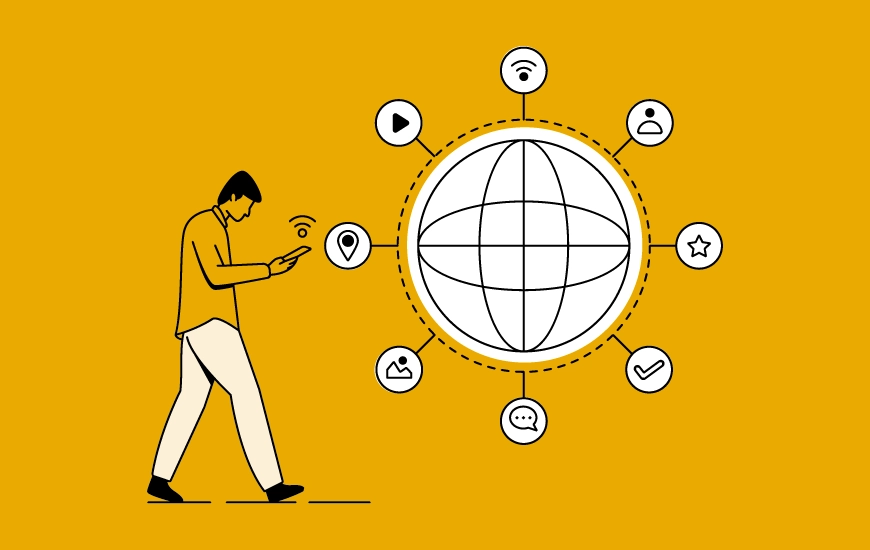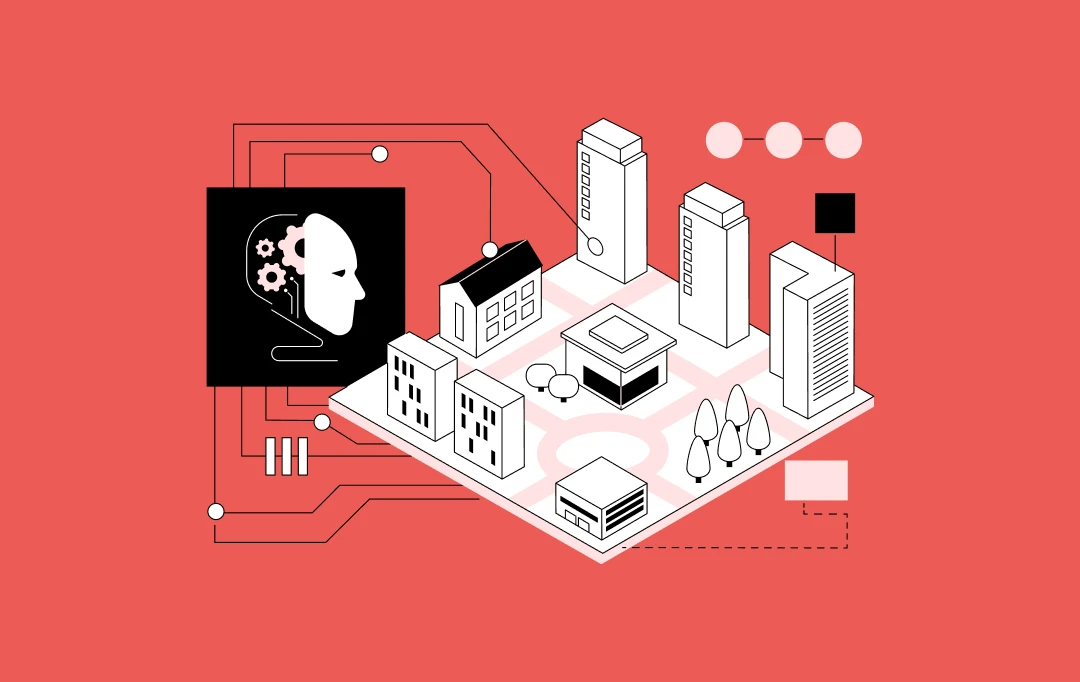- A Quick Glimpse into the Benefits of IoT in Construction
- IoT in Construction: 10 Transformative Use Cases and Their Impact
- Fleet Management
- Tools and Equipment Tracking
- Machine Control
- Construction Site Safety
- Project Management
- Site Monitoring
- Remote Operations & Activity Monitoring
- Fuel Saving
- Environmental Monitoring
- Concrete Curing
- Real-World Examples of Businesses Leveraging IoT in Construction in Their Daily Operations
- Caterpillar Inc.
- Turner Construction
- AECOM
- Skanska
- Challenges Associated with Implementing IoT in the Construction Industry
- High Initial Costs
- Complexity of Integration
- Data Security Risks
- Skills and Training
- Regulatory Compliance
- Future Trends in IoT for Construction
- Advanced Analytics
- Autonomous Equipment
- Green Building Initiatives
- Integration with AI and Machine Learning
- Augmented Reality (AR) and Virtual Reality (VR)
- How Appinventiv Can Help You Leverage IoT in Your Construction Business?
- FAQs
The construction industry has always been the backbone of our infrastructure, but it hasn’t always been quick to adopt new technology. Nevertheless, this fact is changing with the evolution of the Internet of Things (IoT).
IoT has moved beyond being just a buzzword to a fully integrated tool transforming how construction projects are planned, executed, and managed. From enhancing on-site safety to optimizing resource use, this technology is already reshaping how we build and maintain the construction ecosystem.
According to a report from MarketsandMarkets, the global IoT in construction market is expected to reach a valuation of $26.5 billion by 2027, registering a CAGR of 16.5% from 2022 to 2027. The increasing market share can be attributed to the growing adoption of smart devices, real-time data analytics, and automation in the construction industry.

Businesses are leveraging IoT to improve control over their operations, cut costs, and boost productivity. IoT is making building practices more efficient and sustainable by enabling predictive maintenance of machinery, real-time monitoring of construction sites, and better energy management. As more companies see the benefits of IoT, its role in construction is expected to grow even more, driving innovation and establishing new industry standards.
In this blog, we will explore the top use cases that can help you understand the importance of the Internet of Things in construction and its impact on the industry. These examples are bound to highlight how IoT is not just a trend but also a critical component of modern construction practices.
So, without further ado, let’s start with understanding the benefits of IoT in the construction sector a bit more and then move on to the application in short.
A Quick Glimpse into the Benefits of IoT in Construction
IoT technology is revolutionizing the construction industry by enhancing operational efficiency, improving safety, and promoting sustainable practices. The ability to monitor construction sites in real time through IoT devices offers businesses real-time insights into various aspects of the construction process. This continuous flow of data helps in making informed decisions quickly, keeping projects on schedule, and reducing unnecessary costs due to delays.
Furthermore, IoT is also revolutionizing how construction sites manage and utilize data. Advanced IoT analytics allow businesses to analyze operational data extensively, providing insights that enhance efficiency and decision-making. This enables them to optimize workflows, anticipate potential issues early, and align decisions with strategic business goals.
Simply put, the benefits of IoT in the construction industry are multiple and one can easily say that it paves the way for a professional approach to construction management.
According to a PwC survey, major E&C businesses are employing emerging digital solutions in their construction workflows and achieving tremendous results. The survey highlighted that about 32% of businesses are implementing IoT solutions specifically for resource tracking and enhancing safety monitoring on construction sites.

In addition, more than 30% of construction companies are advocating the use of IoT connectivity devices for P&M, such as output and productivity tracking and preventive maintenance tracking. This reflects a growing recognition of IoT in the construction industry and how it helps in improving site safety and operational efficiency.
IoT in Construction: 10 Transformative Use Cases and Their Impact
The integration of IoT in construction is already revolutionizing the industry by enhancing efficiency, safety, and operational control. Here’s how IoT is making significant strides across the construction landscape:

Fleet Management
Fleet management is one of the most common IoT use cases in construction. IoT enables real-time tracking of vehicle locations, fuel consumption, and maintenance schedules. By equipping vehicles with IoT sensors, construction firms can optimize routes, reduce idle times, and manage preventive maintenance more effectively, leading to significant cost savings and efficiency improvements.
[Also Read: 7 Advanced Fleet Management Technologies You Must Implement in Business]
For example, a construction company can use an IoT-based fleet management system to track its dump trucks and cranes across multiple sites. The system alerts managers when a vehicle deviates from its expected route or when maintenance is due, ensuring optimal use and reduced wear and tear.
Tools and Equipment Tracking
Implementing IoT sensors on tools and equipment helps construction businesses monitor their location and operational status, prevent loss, and ensure efficient use. This integration highlights the pivotal role of the Internet of Things in construction, enhancing asset management and operational efficiency.
For example, a construction site manager can instantly locate any item across the site using a mobile app by tagging all handheld power tools with RFID chips. This saves time and reduces the incidence of theft and misplacement.
Machine Control
IoT enables machines to operate with greater precision through remote monitoring and control. This can enhance safety and efficiency by allowing for the remote operation of equipment in hazardous environments or complex tasks.
For instance, excavators that are fitted with IoT sensors can be operated remotely in unsafe terrain, reducing risk to human operators. The sensors provide real-time data on the excavator’s performance, allowing adjustments to be made instantly to optimize speed and power usage.
Construction Site Safety
Construction site safety is another one of the vital IoT use cases in construction that businesses need to understand. IoT devices can monitor construction sites for potential hazards and ensure that safety protocols are followed. Wearables can track workers’ vitals and alert them or their supervisors in case of health risks or accidents.
For example, workers equipped with IoT-enabled safety vests can be monitored for signs of fatigue or heat stress. The system automatically alerts supervisors if a worker’s heart rate exceeds safe levels, enabling quick intervention to prevent health emergencies.
Project Management
IoT in construction project management involves real-time monitoring of progress and resource allocation. This can help in keeping projects on schedule and within budget by providing stakeholders with up-to-date information.
For instance, an IoT system can monitor the amount of materials used daily, alerting project managers when supplies are running low. This allows for timely ordering and delivery of materials, preventing any delays in construction due to a lack of resources.
Site Monitoring
IoT significantly enhances the ability to monitor construction sites by utilizing cameras and sensors. This technology helps in continuously overseeing site activities, ensuring safety and operational efficiency. By monitoring the environment and activities in real time, site managers can quickly respond to any irregularities or safety hazards.
One of the most common IoT in construction examples is IoT-enabled cameras and motion sensors that are installed around a site that can detect unauthorized access after hours. This system alerts security personnel in real time, helping to prevent thefts.
Remote Operations & Activity Monitoring
IoT enhances construction site operations through remote monitoring and control systems, which improve precision and safety. This paves the way for less direct human intervention in potentially hazardous environments.
For instance, IoT sensors in construction devices allow operators to control machinery such as cranes from a distance. This capability not only minimizes the risk to human operators but also enhances the accuracy of the construction tasks being performed.
Fuel Saving
IoT technology in construction optimizes fuel use by providing real-time data on machinery efficiency and operational conditions. This leads to significant savings by preventing overuse and scheduling timely maintenance.
For example, IoT sensors can monitor heavy machinery’s fuel levels and consumption patterns, enabling adjustments that minimize waste and reduce operational costs.
[Also Read: How Much Does it Cost to Develop a Fuel Delivery App like EzFill?]
Environmental Monitoring
Environmental monitoring with the help of IoT sensors is crucial for maintaining safety and compliance on construction sites. Sensors deployed across the site continuously track conditions like air quality, dust levels, and temperature, ensuring they stay within safe and legal limits.
[Also Read: How AI, IoT, and AR/VR Technologies are Helping Companies Achieve their Sustainability Goals]
For instance, IoT sensors can detect the presence of hazardous gasses or excessive dust at a site. Alerts are sent in real-time to the site manager, who can then take immediate measures, helping in mitigating any risks.
Concrete Curing
IoT sensors embedded in concrete provide essential data on temperature and humidity, which are critical for effective curing and overall structural integrity.
For example, these sensors can send real-time alerts to project managers about the status of the concrete, helping them make informed decisions about when to move on to the next phase of construction, thus optimizing the schedule and resource allocation.
After looking into the multiple IoT use cases in construction, let us move ahead and take a look at the major challenges associated with the application of IoT in the construction industry.
Real-World Examples of Businesses Leveraging IoT in Construction in Their Daily Operations
Across the globe, leading businesses are embracing IoT technologies to revolutionize their construction operations, enhancing efficiency, safety, and sustainability. Let’s look at how they are integrating IoT in their construction business in detail below:

Caterpillar Inc.
Caterpillar has implemented IoT to monitor machinery and equipment in real time. This helps them in optimizing maintenance schedules and reducing downtime. By using IoT sensors, they can predict when equipment might fail and schedule repairs in advance, which helps keep their operations running smoothly and efficiently on construction sites.
Turner Construction
Turner Construction uses IoT for better project management and site monitoring. IoT devices on their sites collect data that helps in making informed decisions about resource allocation, timeline adjustments, and safety improvements.
AECOM
AECOM uses IoT technology in their projects to improve how buildings and infrastructure perform. They achieve this by using smarter connections and detailed data analysis. Sensors are also used to keep an eye on construction materials and ensure the structures are sound and safe.
Skanska
Skanska utilizes IoT technology to monitor the environment at their construction sites. They use IoT sensors to track air quality, noise levels, and other important environmental factors. This helps them comply with regulations and reduce their impact on nearby communities.
Challenges Associated with Implementing IoT in the Construction Industry
We all know that IoT for construction presents businesses with significant advantages, but it also comes with its own set of challenges. Overcoming them is essential for companies looking to fully leverage IoT technologies to enhance project efficiency and safety. Let us look at the challenges of IoT in construction project management in detail below:
High Initial Costs
The initial cost of implementing IoT systems in construction can be high, particularly for smaller firms, due to the need for sensors, data analytics, and network infrastructure.
Businesses can reduce the financial burden by starting with pilot projects in critical areas to show quick returns. In addition to this, they could consider partnerships with technology providers who offer scalable solutions.
Complexity of Integration
Integrating IoT solutions into existing construction workflows and legacy systems can be challenging due to compatibility and complexity issues.
Partnering with IoT solution providers who offer customized integration services can help. Thorough training sessions for employees to familiarize them with the new technology can also be effective.
Data Security Risks
With the increase in data flow from IoT devices, there is an increased risk of cyber attacks, which can compromise sensitive project information. This highlights the need to prioritize data security within IoT in construction safety initiatives.
Implementing robust cybersecurity protocols, including regular software updates and stringent access controls, is crucial to handle these issues related to overall data security. Training staff on cybersecurity best practices and conducting regular security audits can further safeguard the data.
Skills and Training
The deployment of IoT technologies in the construction landscape might require new skills that may not be present in the existing workforce.
Developing dedicated training programs for employees and partnering with educational institutions for continuous learning can effectively address this gap.
Regulatory Compliance
Adhering to various regional and international regulations related to data privacy, environmental monitoring, and safety can complicate IoT implementations.
Firms should adopt IoT solutions designed with compliance in mind to ensure compliance with regulatory standards. Engaging with legal experts to understand the implications of IoT deployments can also help navigate these challenges.
Future Trends in IoT for Construction
As technology evolves, the IoT for construction market is expected to experience significant growth and innovation. These advancements are expected to revolutionize the efficiency and safety of construction sites, shaping the future of the industry. Let us look at the future trends expected to revolutionize the impact of IoT in the construction industry:

Advanced Analytics
Internet of Things in construction will enable more sophisticated data analytics, allowing firms to gain deeper insights into operations, optimize resource allocation, and predict maintenance needs with greater accuracy.
Autonomous Equipment
The future is expected to see the rise of autonomous construction equipment that will be equipped with IoT sensors and AI capabilities. This will enhance safety by reducing the need for direct human intervention in hazardous environments.
Green Building Initiatives
IoT will play a pivotal role in promoting sustainability in construction. Smart sensors and data analytics will help optimize energy usage, reduce waste, and meet green building certification standards.
[Also Read: Green AI: How Artificial Intelligence Can Solve Sustainability Challenges?]
Integration with AI and Machine Learning
As AI and machine learning technologies advance, their integration with IoT in construction will streamline decision-making processes and enhance operational efficiencies across projects.
[Also Read: AI in Construction – How Artificial Intelligence is Paving the Way for Smart Construction]
Augmented Reality (AR) and Virtual Reality (VR)
AR and VR technologies, combined with IoT, will revolutionize project planning and execution in the construction sector by providing immersive experiences for design visualization, training simulations, and remote assistance.
You may like reading: How much does it cost to build a construction management app like Fieldwire
How Appinventiv Can Help You Leverage IoT in Your Construction Business?
At Appinventiv, our expertise in IoT positions us uniquely to enhance the technological capabilities of your construction business. Our team of experts has extensive technical experience and a proven track record of delivering successful projects across diverse industries. Furthermore, as a dedicated IoT application development company, we understand the complexities of integrating new technologies with existing systems and can tailor our solutions to meet your specific needs.
Our professionals are well-versed in compliance and regulatory standards, ensuring that all solutions not only meet but exceed the required safety and operational protocols. This knowledge is crucial in deploying IoT effectively while adhering to industry regulations.
Being a renowned construction software development company, we can help you to tap into the potential of IoT to improve operational efficiencies, enhance safety measures, and drive sustainable practices in your workspace.
Our approach to leverage IoT for construction involves a detailed analysis of your current operations followed by the implementation of targeted technologies that guarantee maximum ROI. Let us help you transform your construction processes, making them smarter and more responsive to the challenges of modern construction demands.
FAQs
Q. How is IoT used in the construction industry?
A. IoT enhances construction operations by enabling real-time monitoring and data collection. This includes tracking vehicle and equipment locations, monitoring structural health, and managing supply chains efficiently. Additionally, the impact of IoT in construction can also be seen in improved safety of monitoring sites and worker health through wearable technology that tracks vitals and sends alerts for any safety risks.
Q. What is the cost of developing IoT-powered construction software?
A. The cost of developing IoT-powered construction software typically ranges from $30,000 to $200,000. There are several factors that impact the final cost of development including the overall complexity of the software, the features to be integrated, the scope of integration needed with existing systems, the scale at which the software is intended to operate, software maintenance required, etc. Partnering with a reliable software development firm can help you get clear cost estimates based on your custom business requirements.
Q. What are the key factors to consider when building IoT solutions for your construction business?
A. When building solutions powered by IoT for construction projects, it’s crucial to consider the interoperability of the technology with other business systems already in use. Focus on IoT solutions that enhance communication and data exchange between all parties involved, such as subcontractors, suppliers, and clients. Additionally, assess the scalability and security features of the IoT platform to ensure it can support growing business needs and protect sensitive data effectively.



Exploring IoT in Telecommunication - Use Cases, Benefits, Challenges, and Strategic Implementation
Telecom is the foundation of modern-day connectivity, supporting the communication networks that keep the world linked. But with the growing dependency of always being on and connected, led by the rapid pace of technological advancement, including 5G deployment, requires telecom operators to adapt quickly. With trillions of connected devices set to enter the digital space…

Top 10 Use Cases and Benefits of IoT Energy Management Changing the Power Industry
The escalating demand for energy consumption worldwide is projected to reach around 800 exajoules by 2050, a big jump from over 600 exajoules in 2019. This fastest-growing global energy use is throwing a major curveball - prioritizing smart energy for waste management. In this pursuit, the rise of the Internet of Things (IoT) offers a…












